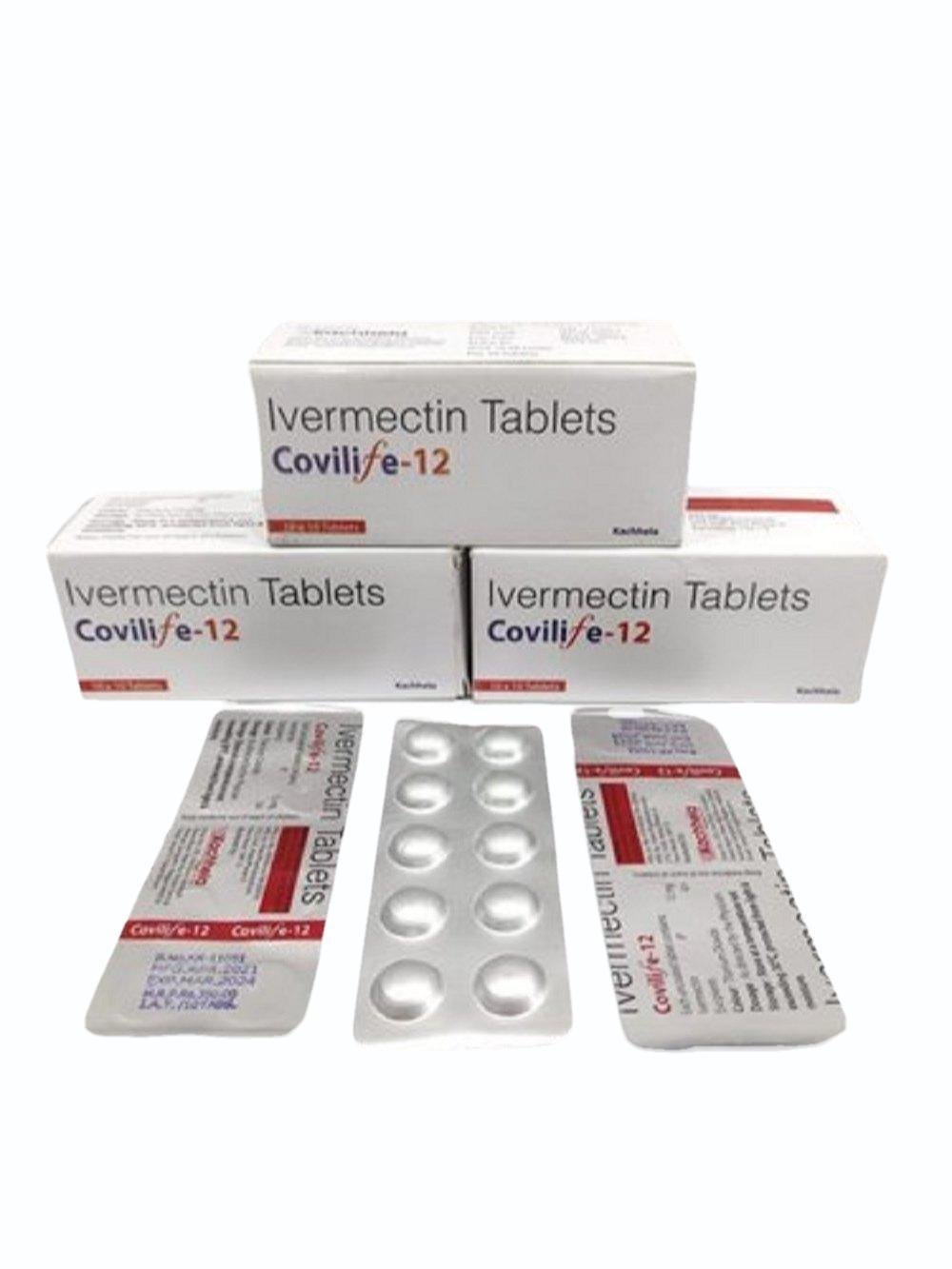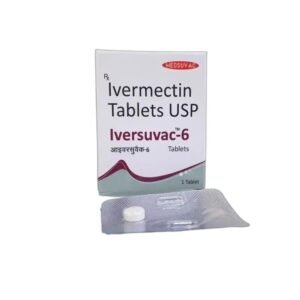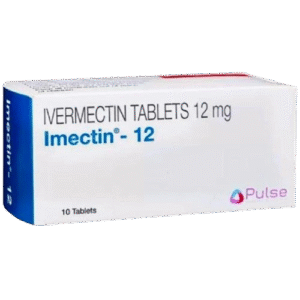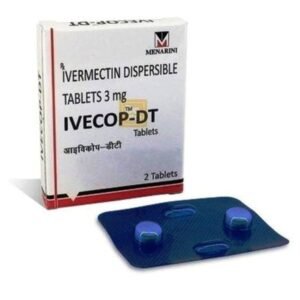Covilife 12mg is a medication that is used to cure parasitic infections and contains ivermectin. It disables and kills the parasites, helping to effectively relieve conditions such as onchocerciasis, strongyloidiasis, scabies, and lice.
Ivermectin binds to glutamate-gated chloride channels in the nerve and muscle cells of the parasite that results inti paralysis and ultimately death of a parasite.
| About Covilife |
|---|
| Drug Class: Antiparasitic |
| Subclass: Anthelmintic (anti-worm) medication |
| Product Details | |
|---|---|
| Composition | Active ingredient: Ivermectin Inactive ingredients: • Microcrystalline cellulose • Magnesium stearate • Silicon dioxide • Croscarmellose sodium • Corn starch |
| Packaging Type | Blister |
| Pack Size | 10×10 |
| Dosage | 12 mg |
| Therapeutic Class | Antiparasitic |
| Action Class | Anthelmintic agent |
| Chemical Class | Avermectin derivatives |
| Manufacturer | Kachhela Medex Private Limited |
| Shelf Life | 2–3 years from the date of manufacturing |
| Usages | Treats parasitic infections such as Strongyloidiasis, Onchocerciasis, Scabies, and certain worm infestations. |
| Country of Origin | Nagpur, India |
| Storage | Store Covilife in a cool, dry place, away from direct sunlight and moisture. |
How does Covilife 12 mg work?
Covilife 12mg acts by disrupting the parasite’s nervous system, eventually leading to death. It attaches to glutamate-gated chloride channels of the parasite’s nerve and muscle cells, which makes the cell membrane more permeable to chloride ions. Paralysis and death of the parasite result.
- Binding to Glutamate-Gated Chloride Channels: Ivermectin binds to glutamate-gated chloride channels in the nerve and muscle cells of the parasite.
- Increased Permeability: The binding increases cell membrane permeability to chloride ions, causing the cell to take in chloride ions.
- Hyperpolarization: The heightened influx of chloride ions hyperpolarizes the cell membrane, making it challenging for the parasite’s nerves and muscles to function.
- Paralysis and Death: The parasite’s failure to operate adequately causes paralysis and eventually death.
- Elimination: The parasites are then removed from the body by the body’s natural processes of the immune system.
Uses of Covilife 12 mg tablet
- Covilife 12 mg is used to treat Strongyloidiasis: Intestinal infection caused by Strongyloides stercoralis
- It is used to treat Onchocerciasis (River Blindness): An infection caused by the Onchocerca volvulus parasite.
- Scabies can be treated by Covilife medicines: Skin infection caused due to mite infestation.
- Lice Infestations: This medication is a useful alternative when topical treatment is failing or inconvenient.
Side effects
- Dizziness
- Drowsiness
- Headache
- Nausea and vomiting
- Diarrhea
- Abdominal pain
- Skin rash or itching
Dosage
This medication is used for moderate conditions or weight-based dosages. The adult dosage is usually 200 mcg/kg, taken as a single dose.
- Strongyloidiasis: 200 mcg/kg as a single dose, taken on an empty stomach.
- Onchocerciasis: 150 mcg/kg as a single dose, repeated every 3-12 months.
- Scabies: 200 mcg/kg as a single dose, repeated after 7-14 days.
Interaction
It can interact with other drugs, including:
- Blood thinners: Risk of bleeding is increased
- Antiepileptic drugs: Efficacy is decreased or toxicity is enhanced
- Other antiparasitic drugs: Risk of adverse effects is increased
- Alcohol: Risk of side effects is increased
Pharmacokinetics
- Absorption: Ivermectin is slowly and in a variable manner absorbed from the gastrointestinal tract.
- Distribution: It is widely distributed around the body, including the brain.
- Metabolism: It is metabolized in the liver.
- Excretion: Ivermectin is mainly excreted in the feces.
Clinical Trials
Various clinical trials have proven the efficacy and safety of Ivermectin in the treatment of various parasitic infections, including:
- Strongyloidiasis: Ivermectin has been proven to be very effective in the treatment of strongyloidiasis, and cure rates vary from 90-100%.
- Onchocerciasis: Ivermectin is effective in the reduction of micro filarial load and clinical improvement in onchocerciasis patients.
Precautions
- Pregnancy and breastfeeding: Use cautiously and under medical guidance.
- Children: Use cautiously and under medical supervision, particularly for children weighing less than 15 kg.
- Liver or kidney disease: Use cautiously and under medical supervision.
- Neurological disorders: Administer with caution and under a doctor’s supervision.
Conclusion
Covilife 12 mg (Ivermectin) is a good antiparasitic drug for managing parasitic infections. It is, however, important to adhere to the prescribed dosage as well as administration regimen and to disclose any drugs or products you are currently taking to your doctor to avoid possible interactions and side effects.
FAQs
-
What is Covilife 12 mg used for?
Covilife 12 mg is used for the treatment of parasitic infections such as strongyloidiasis and onchocerciasis.
-
How does Covilife 12 mg works?
Covilife acts by disrupting the parasite’s nervous system, eventually leading to death.
-
Is Covilife 12 mg safe for everyone?
Yes, Covilife 12 mg is generally safe for everyone but it is recommended to use after consulting your doctor.
-
What can be the possible side effects?
The possible side effects are dizziness, diarrhea, headache, Nausea and vomiting
-
Does this medication show any interaction?
Yes, this medication shows interaction with alcohol, blood thinners, and certain antiepileptic medications etc.
References
https://pubmed.ncbi.nlm.nih.gov/35225114/
https://pubmed.ncbi.nlm.nih.gov/37731824/
| covilife 12mg | 30 Tablets $50, 50 Tablets $80, 100 Tablets $140, 300 Tablets $290 |
|---|
1 review for Covilife 12mg
It is highly recommended to consult a healthcare provider or doctor before using any of the above medications. This content is for educational purposes only. We advise you to read all the information mentioned by the manufacturer on the medicine before using it.








Camila Lopez –
Highly recommended.